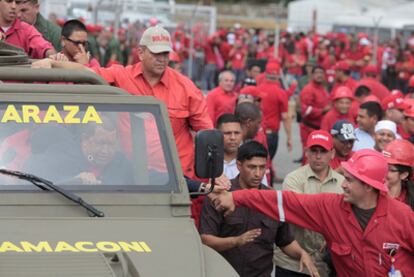Tensions build between US and Venezuela after consul is expelled
Diplomat based in Miami is said to have asked for American nuclear codes
With relations already tense as a result of Iranian President Mahmoud Ahmadinejad's official visit to Caracas, a fresh row blew up over the weekend between President Hugo Chávez and Washington following the expulsion of Venezuela's consul from Miami.
Chávez called the United States "counter-revolutionaries" while making a pledge to Ahmadinejad on Monday not to turn his back on Iran. Washington had been pressuring Latin American nations to cool ties with Tehran because of its nuclear policy. Ahmadinejad is on a four-nation tour of Latin America.
But the strains became worse when the State Department informed the Venezuelan Embassy in Washington on January 6 that its Miami consul, Livia Acosta Noguera, had been declared persona non grata. She was given until Tuesday to leave the United States but she had already returned to Venezuela when the expulsion order came through, Chávez said.
"We do not take it lightly when we declare somebody persona non grata"
In a briefing on Monday, a State Department spokeswoman said she was not going to comment on the reasons why Acosta was asked to leave. "But I will tell you that we do not take it lightly when we declare somebody persona non grata, and in this case I'm not going to go any further in order to protect sensitive information," the spokeswoman said.
Last month a news report on the US Spanish-language television Univisión network claimed that Acosta had taken part in discussions about carrying out possible cyber attacks against the United States while she was serving in Mexico. The documentary, which focused on Iran's alleged terrorist activities in Latin America, featured a taped segment in which Acosta allegedly asks a Mexican hacker to give her access codes to nuclear facilities in the United States.
Acosta was also on the payroll of Venezuela's intelligence service, the SEBIN, according to the Miami Herald and Efe, which quoted a former security aide to the Venezuelan army. Chávez called her "a dignified professional" who was "attacked, slandered and demonized by that group of extremists in the United States and now by Barack Obama's government."
"It's another demonstration of the ridiculous empire's arrogance," he said during a news conference with Ahmadinejad.
Venezuelan Foreign Minister Nicolás Maduro said that the Chávez government "would respond firmly" and at "the opportune" moment.
Meanwhile, a group of Florida lawmakers has asked the State Department to investigate Venezuela's consulates across the United States to determine whether there are double agents working out of the missions.

Tu suscripción se está usando en otro dispositivo
¿Quieres añadir otro usuario a tu suscripción?
Si continúas leyendo en este dispositivo, no se podrá leer en el otro.
FlechaTu suscripción se está usando en otro dispositivo y solo puedes acceder a EL PAÍS desde un dispositivo a la vez.
Si quieres compartir tu cuenta, cambia tu suscripción a la modalidad Premium, así podrás añadir otro usuario. Cada uno accederá con su propia cuenta de email, lo que os permitirá personalizar vuestra experiencia en EL PAÍS.
¿Tienes una suscripción de empresa? Accede aquí para contratar más cuentas.
En el caso de no saber quién está usando tu cuenta, te recomendamos cambiar tu contraseña aquí.
Si decides continuar compartiendo tu cuenta, este mensaje se mostrará en tu dispositivo y en el de la otra persona que está usando tu cuenta de forma indefinida, afectando a tu experiencia de lectura. Puedes consultar aquí los términos y condiciones de la suscripción digital.








































